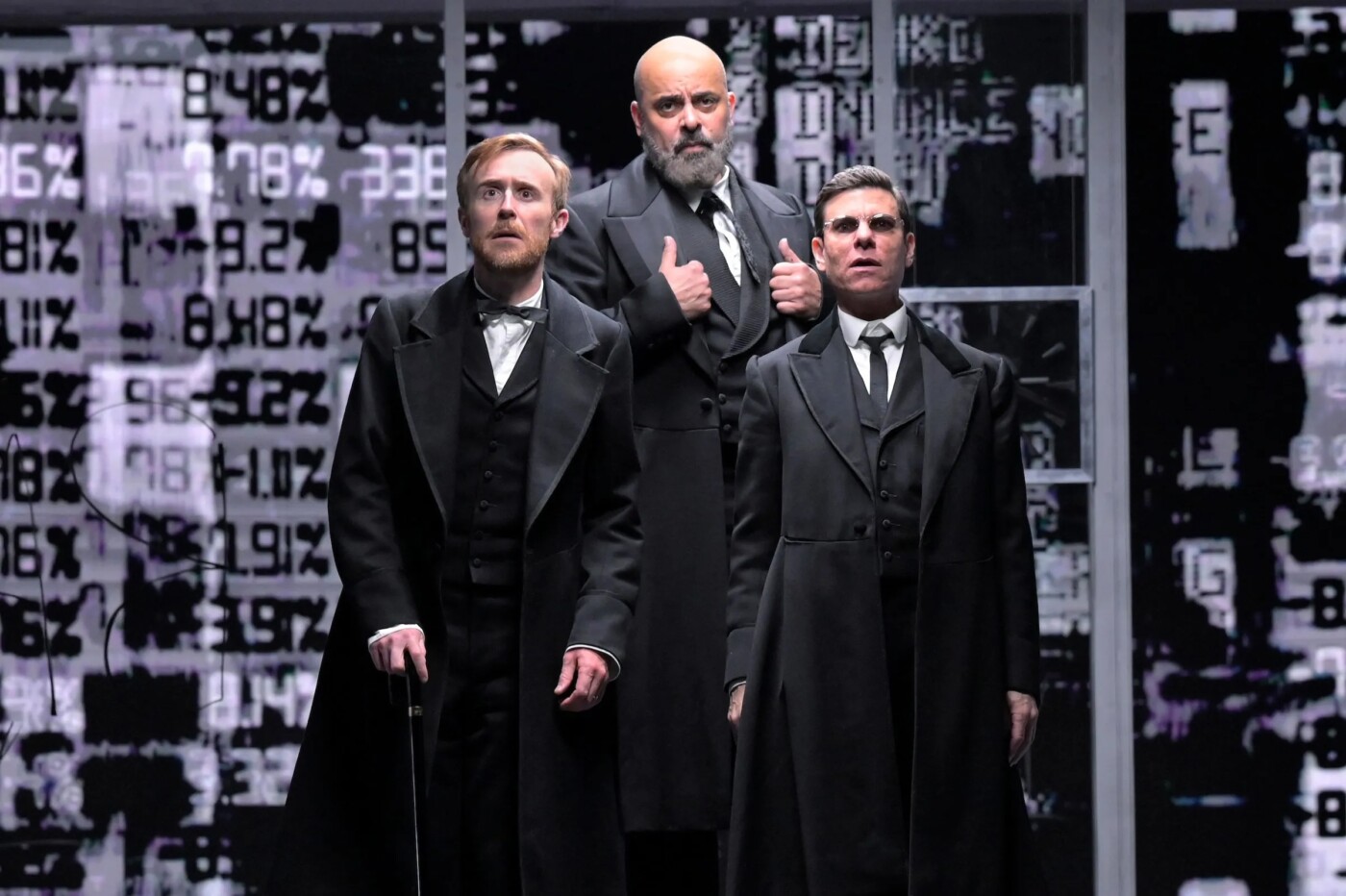The set design, the stage movement, the multimedia sound effects, the musical accompaniment, the acting: They’re all so dazzling, so imaginative, so precise in internationally acclaimed director Sam Mendes’ production of the Tony Award-winning hit “The Lehman Trilogy” that it hardly matters that the story—of the American Dream ultimately shattered—offers no new Big Idea to ponder.
Even the details of the Lehman brothers’ trajectory over time—from 1844, when the first brother, Chaim (quickly assigned the name Henry at Ellis Island), arrived here from Bavaria, presumably penniless and barely speaking English, to the financial behemoth’s downfall in 2008 and the resulting worldwide financial collapse—are easily accessible.
This is no new take on the evils of capitalism—in the Bay Area we have the San Francisco Mime Troupe for that—but it’s an example of the very best way that acting and stagecraft can serve simple storytelling, never overpowering the story itself but always, consistently, beautifully, enhancing it. In three acts and three and a half hours, it’s consistently engrossing.
Stefano Massini’s script, adapted by Ben Power in this joint American Conservatory Theater/National Theatre/Neal Street Productions co-presentation, is straightforward.
The first brother (played by John Heffernan), “a Jew with only one piece of luggage,” appears silently out of the shadows. He speaks so quietly of his rapture at arriving in “that great music box called America” that he sets the tone for a play in which every word registers and nothing—no expression of emotion, no light cue, no sound effect — is extraneous. Each moment feels crystalline.
The set (designed by Es Devlin) that represents America is a great glass box that rotates as Henry and the brothers that follow him to America, Mayer (Aaron Krohn) and Emanuel (Howard W. Overshown), set up a clothing shop in Alabama and eventually—as their business expands to brokering raw cotton and more, and finally, of course, to finance—to Wall Street.

Except for a few stunning moments, “The Lehman Trilogy” is entirely black and white. That includes the costumes and the still images and silent videos (created by Luke Halls) that encompass the glass box. Surrounding cityscapes behind the box transform so subtly as time passes, you barely notice them changing and morphing amid designer Jon Clark’s stark, effective lighting.
The three brothers, their three distinctively different personalities so well delineated by the actors, squabble, marry, have recurring nightmares about the future as their empire inexorably grows, have sons of their own, and those sons have sons. The original brothers die, one by one, and Kaddish, the Jewish prayer for the dead, is intoned–thankfully, no extraneous sentimentality.
The three actors play not only the original trio of immigrants but also their progeny and a host of other roles, each one, from the largest to the smallest, even a wide-eyed, thumb-sucking baby, in precise detail. Their empathy lends this production its solid, human core—and its humor, too.
Along the way, history happens: the Civil War, locomotives, electricity, the fateful 1929 stock market crash (particularly chilling), and much more. The details of the Lehman brothers’ wheeling and dealing tend to zoom by—it’s hard to keep track of what they’re up to at times, the ways in which they’re seizing the moment: “It’s not luck, it’s strategy,” emphasizes Emanuel’s flinty-eyed son, Philip, while his cousin Herbert, son of Mayer, puts it flatly this way: “We use money to make more money.”
And there’s the piano music, with its at times melancholic, at times dramatic, at times klezmer-like melodies (composer-sound designer Nick Powell), played in view of the audience by Rebekah Bruce. It’s just one more perfect touch in a play that illuminates a bit of American history in a way that surely could not have been told as well in any other form.
“The Lehman Trilogy” continues through June 23 at American Conservatory Theater’s Toni Rembe Theater, 415 Geary St., San Francisco. Tickets are $29 to $152 at act-sf.org.
The post Review: ACT’s ‘Lehman Trilogy’ a perfectly dazzling portrait of a family and America appeared first on Local News Matters.
